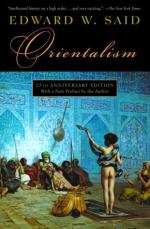|
This section contains 12,614 words (approx. 43 pages at 300 words per page) |

|
SOURCE: “Perversion, Parody, and Cultural Hegemony: Lord Byron's Oriental Tales,” in The South Atlantic Quarterly, Vol. 88, No. 3, Summer, 1989, pp. 569-603.
In the following essay, Christensen surveys Lord Byron's Oriental verse tales and suggests that he may have employed Orientalist motifs to expose “the primal foreignness” of the English language.
[Byron] has no light, cannot lead us from the past to the future.
—Matthew Arnold, Poetry of Byron
Oh! laughter for the Page that would reflect To future times the face of what now is!
—William Wordsworth, The Prelude
The general problem of oppositional writing—its authenticity, its effectiveness, even its possibility in relation to a hegemonic discourse—is focused in a particularly challenging way in Lord Byron's poetry. For Byron to write in opposition meant to write against himself, or at least against “Byronism,” that systematically elaborated, commercially triumphant version of himself devised and promoted by his publisher...
|
This section contains 12,614 words (approx. 43 pages at 300 words per page) |

|


